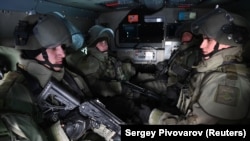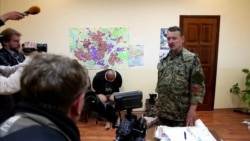On January 20, Kremlin spokesman Dmitry Peskov responded to U.S. President Joe Biden’s comment, made at a press conference the previous day, that stiff sanctions would be imposed on Russia if it renewed its invasion of Ukraine.
Peskov said:
"All these statements can contribute to the destabilization of the situation, because they can inspire completely erroneous hopes in the hot heads of some representatives of Ukraine, the Ukrainian leadership, who on the sly, if you will, can decide to start a new civil war in their country and try to solve the problem of the southeast.”
The insinuation that Ukraine wants a civil war is false.
As Polygraph.info and other publications have shown, the existing conflict in Ukraine’s eastern Donbas region is not a civil war. Rather, the conflict was orchestrated with the help of the Russian military with local collaborators in the aftermath of Russia’s 2014 annexation by force of Ukraine’s Crimean peninsula.
Russia has perpetuated the war in the Donetsk and Luhansk provinces by supplying proxy forces with weapons, including armor and heavy artillery, along with ammunition, fuel and other vital supplies.
Despite Russian denials, there is abundant evidence. It includes social media posts by Russian soldiers, memorials, family member testimony, satellite imagery, reports by the Organization for Security and Co-operation in Europe’s Special Monitoring Mission, and, most recently, a Russian court document attesting to military involvement.
Some of the men who led Russia’s proxy forces in Ukraine have gone public. Igor Girkin, a.k.a. Strelkov, was a senior commander of Russia’s forces in Donbas in 2014. A Russian citizen and former intelligence officer, Girkin told an interviewer that he and his group of armed men were responsible for sparking the war. Currently Girkin is on trial in absentia in a Dutch court in The Hague, charged along with two other Russian nationals and one Ukrainian national with being responsible for the downing of Malaysian Airlines Flight MH17, which led to the deaths of 298 people.
Like Girkin, many Russian fighters in Donbas are former military or intelligence operatives, or officially “resigned” to take part in the conflict.
More recently, Alexei Borodai, a Russian citizen who served as the original “prime minister” of the purported “Donetsk People’s Republic” and who was recently elected to Russia’s State Duma, admitted in an interview that the “civil war” narrative was a deliberate falsehood.
Asked why he had returned to Russia, Borodai said it was important for the Kremlin to push the idea that the conflict in eastern Ukraine was a “civil war.”
Borodai was replaced by Alexander Zakharchenko, a resident of eastern Ukraine. Russia has granted citizenship to the current DNR leader, Denis Pushilin. Over the past few years, Russia has handed out thousands of Russian passports to residents of its puppet statelets.
Ukraine has not conducted any significant offensive military operation in the Donbas since the battle of Shyrokyne in the summer of 2015. There have only been limited actions in the “gray zone” – a buffer area between the opposing forces.
Ukrainian citizens live in settlements inside these zones, and Ukrainian forces have established control over many to provide humanitarian aid and utilities for those unable to leave.
Ukrainian President Volodymyr Zelensky’s administration has stated it has no plan for a major offensive to forcibly retake the occupied territory in Donbas. Zelensky reiterated that earlier this month, when he unveiled plans for reintegration of the territories, calling military methods off-limits.
To date, the conflict has seen over 14,000 killed and nearly two million displaced. The economy of Russia’s puppet states in Donbas remains in shambles. Since 2015, the war has largely resembled trench warfare, with snipers and artillery causing most casualties.
Biden addressed the Ukraine conflict during a January 20 news conference, saying that he believed Russian President Vladimir Putin would “go in,” and warning Russia would pay a “high price” in response.
But one Biden comment caused confusion in Washington, among European allies and in Ukraine.
“It's one thing if it's a minor incursion and we end up having to fight about what to do and not do," Biden said.
Zelensky was among those who took issue with the term “minor incursion.”
“We want to remind the great powers that there are no minor incursions and small nations,” he tweeted. “Just as there are no minor casualties and little grief from the loss of loved ones.”
Biden later clarified his position.
"I've been absolutely clear with President Putin,” Biden said. “He has no misunderstanding. If any – any – assembled Russian units move across Ukrainian border, that is an invasion.
“But it will be met with severe and coordinated economic response that I've discussed in detail with our allies, as well as laid out very clearly for President Putin."
U.S. Secretary of State Anthony Blinken met with Russian counterpart Sergei Lavrov in Geneva on January 21 for more talks on Russia’s demand for a pledge to keep Ukraine out of the West’s NATO security alliance. The two agreed to continue negotiating.
Nonetheless, Russia has continued to move troops in the direction of Ukraine, with forces arriving in neighboring Belarus, a Russian ally. Some 100,000 troops along with tanks and other armaments are reportedly massed only the border.
Meantime, some NATO members have upped their military support for Ukraine. The United Kingdom has begun sending thousands of light anti-tank weapons (NLAW rocket launchers) along with personnel to train Ukrainian troops how to use them.
Lithuania, Latvia and Estonia obtained authorization from Washington to transfer U.S.-made weapon systems to Ukraine. The Czech Republic has also pledged military aid.
On the other hand, Germany still refuses to provide arms for Ukraine, and has reportedly blocked Estonia from transferring Germany-origin arms to Ukraine. German Chancellor Olaf Scholz reportedly refused an emergency talk with President Biden to discuss the issue, although scheduling conflicts may have been a factor.
Meanwhile, French President Emmanuel Macron has stated that the European Union should "start its own dialogue" with Russia over Ukraine.






